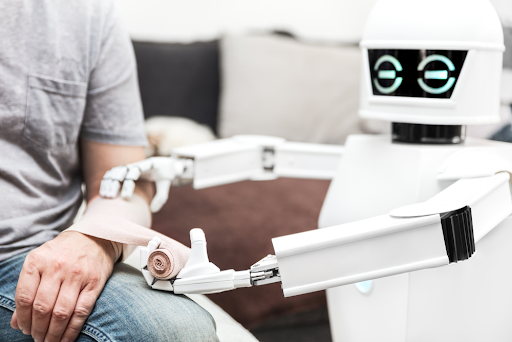Our imagining of futuristic technologies doesn't always match the technologies as they exist in the real world. The perfect example of this is artificial intelligence. Most people think of walking, talking robots with opinions and emotions when they think of AI; this tech is wrapped up with the concept of sentience and deep-seated fears that humanity's creations will cause its downfall. Yet, in practice, AI is hardly more than a particularly complex computer algorithm, coded to analyze data better than algorithms that came before.
Still, concerns about the impact of using AI continue to proliferate. Especially because AI's use in healthcare is increasing, many worry that AI could fully replace healthcare providers, like doctors, in the near future. Could this fear become reality, or is it like so much else in science fiction - utterly idealistic?
AI Won't Cause Doctors to Go Extinct
Experts in both AI and healthcare fields will confidently say that artificial intelligence will never fully replace doctors. There is no future in which humans are completely absent from the healthcare field. There are three primary reasons why healthcare needs living, breathing doctors:
Computers Can't Simulate Empathy
Healthcare is an exceedingly human field because health is closely tied to human emotions like joy and suffering. Not only do healthcare providers analyze health data and make predictions - both of which an AI can do handily - but healthcare providers also extend empathy to their patients. Patients need to experience human emotions from providers; empathy is essential in communicating circumstances and building trust. Because most AI tools are not built to mimic emotions, AI will not be valuable in most patient-facing healthcare functions.
Doctors Don't Always Work Linearly
In medicine, 1 + 1 often equals 2, but sometimes, 1 + 1 has nothing to do with the issue at hand. A patient can display all the symptoms of a particular disease but suffer from a completely different disease, or perhaps no disease at all. Patients and their lifestyles are unique, and human providers understand this in ways machines simply cannot. Because AI can only come to conclusions based on the data they are fed, they are unlikely to consider non-linear solutions, which could cost patient lives.

Professionals and Tech Work Together
Even the smartest, most advanced technology requires a human user. AI tech cannot operate on its own; it cannot aggregate the right kind of data or determine which analyses are appropriate or correct. As AI tools become better adapted to the healthcare industry, healthcare providers will need to gain qualifications in using AI, but it is inconceivable that AI will operate entirely independent of knowledgeable and skilled healthcare professionals.
AI Will Improve the Healthcare Industry
Doctors will continue to be vital in delivering healthcare to patients, but AI in healthcare is undeniably valuable. Research on the technology has found several use cases, from emergency medicine to disease prediction to genetic therapies and more. Doctors will need to work hand in glove with AI programmers and the programs themselves because AI offers these benefits:
AI Can Reduce Physician Errors
Because AIs are trained to look for specific data sets, they are efficient at targeting health issues - whereas doctors might be overwhelmed by the amount of data in certain cases that they miss important clues. An excellent example of this is in medical imaging: Radiologists have an astonishing 30 percent error rate, which AI could help reduce by assisting in the search for specific disease markers. AI is also being implemented in emergency medicine, to shave vital seconds off the administration of emergency treatment to save lives. As humans, doctors and other healthcare providers are fallible, but working with tech can reduce the frequency and intensity of their errors.
AI Can Bring Better Healthcare to Underserved Communities
There is a perpetual shortage of doctors and nurses, and underserved communities tend to be those in poor and rural areas. Though AI won't replace doctors, it could extend their reach into these zones. Because AI can improve efficiency, healthcare facilities in underserved areas that utilize AI are better equipped to handle more patients with fewer staff. Because no other solution has come close to resolving the issue of underserved communities, this opportunity for AI is significant.
The future of healthcare certainly includes tools driven by artificial intelligence - but that doesn't mean doctors are going the way of the dodo. Healthcare needs both humans and tech to deliver the best possible outcomes to patients.
* This is a contributed article and this content does not necessarily represent the views of sciencetimes.com















